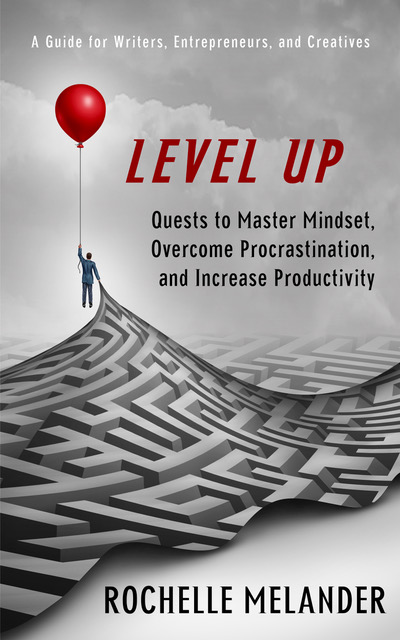 Guest post by: Level Up author Rochelle Melander
Guest post by: Level Up author Rochelle Melander
My first book came out twenty years ago. For years I’ve juggled coaching, editing, writing, teaching, parenting, and having a life. And even though I’ve gotten better at managing my time, I’m finding it increasingly more difficult to get it all done. My clients face the same struggles. As they strive to run their businesses as coaches, consultants and freelance writers as well as building a platform and promoting their books—they struggle to find time to write.
Why is it so hard?
Writers have always had to manage writing and promoting. Most of us also need to earn a living along with working on our books. None of that is new. But I believe that we are facing more distractions than ever before. And that’s the key word: MORE. Writers have always had distractions, today we have more of them. Writers have always had to market their work, today we have to do more of that. And publishers have always asked writers to promote their books, it’s just today they depend more on our platforms.
When we do a little more and have a few more distractions, it adds up. And all that takes time away from writing. Here’s my plan to help you get writing done.
One: Discover and preserve your genius time
Genius time is that part of the day when you’re a writing wizard. That doesn’t mean you cannot write at other times of day, but you might not be as fast or as focused. As a morning writer, I don’t want to waste my mornings with email, social media, or meetings. I need to use those precious hours to write. But your genius time might be in the afternoon or just before bed or while you’re eating lunch. Your job is to protect and nurture your genius time no matter what happens.
Try this: Map your energy. Take a look at your most productive days. Map when you have performed like a writing genius but also consider when you’re a genius at idea development, researching, pitching, and networking.t social, intellectual, creative, and physical tasks. Set aside time to write during your genius time.
Two: Schedule everything
The most successful people schedule their days. They know what they want to achieve and schedule their tasks so that they can reach their goals. In Peter Bregman’s book, 18 Minutes he quoted a study of two groups of recovering drug addicts who were asked to write an essay before 5 PM on a certain day. The first group was given no more instructions. The second group was asked to decide when and where they would write it. No one in the first group completed the essay but 80 percent of the people who scheduled their when and where finished the essay.
Try this: You’ve mapped your energy and know when you write best. You also know when you do everything else well. No doubt, you know what you need to do to reach your goals. Now schedule those tasks in your calendar.
Three. Take small steps
I’ve had many clients who’ve set aside genius time and suffered through days or weeks of getting nothing done. They look at their to-do list and freeze. When they see the tasks they’ve scheduled—work on memoir, write article for professional journal, expand social media reach—they feel overwhelmed.
It’s not surprising. We don’t do well with giant steps or drastic changes. Why do you think so many of us fail at these lifestyle-changing diets? The fear part of our brain freaks out. Instead of cleaning the basement, revising the novel, or writing that book, we will do just about anything to avoid that big, scary goal.
Don’t worry. Take a deep breath. I have a solution for you: take a small step. According to Robert Maurer, author of One Small Step Can Change Your Life: The Kaizen Way, we avoid that sinking feeling by taking absurdly small steps toward our goals. Instead of filling our to-do list with big chunk like, “Write book,” we list tiny actions like “write a paragraph about the characteristics of the woolly bear caterpillar” and “research periodicals that take stories about nature.”
Try this: Write down a small step you can take toward finishing your big project. If your stomach still flips or sinks, then you need an even smaller step.
Pro tip: I’ve found it helpful to list a bunch of small steps toward my big goal at one time. That way, I have some choices about which small step I’d like to tackle.
Four: Remove distractions
Distraction has become a way of life. Our smart phones buzz constantly with texts, calls, and alerts. Notifications pop up when we’re using our computers and tablets. But all of these interruptions are damaging our ability to write.
Research by Cyrus Foroughi, a PhD candidate out of George Mason University, suggests that small interruptions decrease our ability to write well. In two studies, participants were asked to outline and write an essay. In the first, some were interrupted at regular intervals. In the second, they were interrupted at random times. But the result was the same: those who were interrupted wrote less and scored lower than their peers.
What does this mean for you? That genius time you just scheduled? Make sure that you remove the distractions. If you can, turn off your phone and shut down the Internet. If you can’t trust yourself to stay offline, use an app like SelfControl Freedom to block email, certain websites, or the whole internet.
Five: Take energy-restoring breaks
We cannot be productive all the time. Our ability to pay attention and focus dwindles throughout the day. But taking breaks can help us to refresh ourselves and renew our focus.
A study by Marc G. Berman, John Jonides, and Stephen Kaplan at the University of Michigan found that walking in nature can restore our ability to pay attention. For urban dwellers, it takes more than walking around outside—since paying attention to street and sidewalk traffic uses up more attention. Instead, head to a park for your walk.
Other ways to boost your energy? Take a nap, play with a pet, do a repetitive task, like knitting or folding laundry.
Putting it all together
These five steps will help you get more writing done with less stress. And if you can’t always write at your genius time, don’t worry—writing at your “off” times of day will help strengthen your writing muscles.
 Rochelle Melander is a speaker, certified professional coach, and the bestselling author of twelve books, including Level Up: Quests to Master Mindset, Overcome Procrastination and Increase Productivity and the forthcoming, The Book of Me: 101 Ways to Tell Your Story. Through her writing and coaching, Rochelle Melander helps writers, creatives, and entrepreneurs overcome distractions and procrastination, design a writing life, turn their ideas into books, navigate the publishing world, and connect with readers through social media. She is the founder of Dream Keepers, a writing workshop that supports teens in finding their voice and sharing their stories. Visit her online at writenowcoach.com.
Rochelle Melander is a speaker, certified professional coach, and the bestselling author of twelve books, including Level Up: Quests to Master Mindset, Overcome Procrastination and Increase Productivity and the forthcoming, The Book of Me: 101 Ways to Tell Your Story. Through her writing and coaching, Rochelle Melander helps writers, creatives, and entrepreneurs overcome distractions and procrastination, design a writing life, turn their ideas into books, navigate the publishing world, and connect with readers through social media. She is the founder of Dream Keepers, a writing workshop that supports teens in finding their voice and sharing their stories. Visit her online at writenowcoach.com.
Twitter: @WriteNowCoach
Facebook: https://www.facebook.com/WriteNowCoach/
Instagram: https://www.instagram.com/writenowcoach/
![]()

One comment on “5 Ways to Boost your Writing Productivity”
Comments are closed.